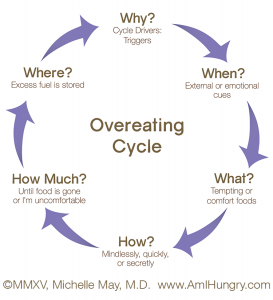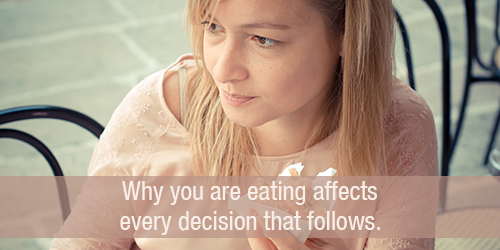How can you end emotional eating?
You can’t!
Eating for emotional reasons is normal—we all do it! As humans we associate food with pleasure and comfort from our first moments of feeding, to birthday cakes, to pleasant memories of backyard burgers with our families.
Food adds pleasure and comfort to our lives in many ways that are deeply tied to traditions as well as our emotions and memories. And there is nothing wrong with that!
So how does emotional eating become a problem for many people?
Why you eat is as important as what you eat!
In my video, Why do I keep struggling with the same eating issues?, I shared the realization that why I was eating affected every decision that followed, including my food choices. So, when I am eating because of emotional triggers, it affects when I feel like eating, what I want to eat, how I eat it, and definitely how much I eat!
So think about why you eat, when you eat, and what you eat and let’s do a little more work to figure out the clues left by your emotional eating triggers.
It is clear from your comments on that video that you want to end emotional eating that disconnects you from taking care of your true needs, so you can live fully and vibrantly. But how do you know what those needs are?
Look for clues in your emotions.
When a craving doesn’t come from hunger, eating probably won’t satisfy it. Your emotions give you clues about how to meet your true needs.
Emotional Eating and the Overeating Cycle
Eating out of habit or for emotional reasons can create a predictable pattern called the Overeating Cycle.

Decode your emotions.
Identifying why you eat is sometimes the easy part.
So, you know you eat when you’re sad. Now, what do you do about it?
Many of you shared that you struggle food and want to end emotional eating. Use the fill-in-the-blank script I shared with you in the video to decode you emotions:
- Think about a situation when you are more likely to overeat.
- Identify the emotion(s) you typically experience in that situation.
- Think about what that emotion is telling you about your underlying need(s).
- Now, what is one small step you can take now to meet that need more effectively than eating?
Next, in this video, I shed light on a very common but often unrecognized trigger for overeating.
(This article has been updated from a previously published version.)
Did you enjoy this post? Check out these other posts on emotional eating and mindful eating:
Why do I overeat when I’m stressed?
What if I binge because I feel a lack of love and belonging?
How to Make Sense of Your Eating Issues
When you’re ready to learn how to trust your body wisdom and eat fearlessly, join us for the Eat Mindfully, Live Vibrantly Program!. Click here to learn more!



14 thoughts on “End emotional eating by decoding your triggers”
Thank you for the video, I believe this will truly help me.
The one that came to mind that I am unsure of:
When I wake up from an afternoon nap (needed as my body is recovering)
I feel like I am hungry for something sweet or salty
I Need – ??
I Will – drink a glass of water and get up and move around.
I am not sure what my need would be
I just want to tell Dr. May that this is the first program that has really effectively helped me overcome my yoyo dieting. I have had eating disorder issues since my early teens, and am now a 64 yr old woman that is finally finding a bit of peace with herself and her body! I’ve gone through therapy and group, but your mindful eating program and videos are crucial to my recovery as well. Thank you from the bottom of my heart.
When I get in a funk in the evening I feel frustrated, entitled and the surprising one hopeless. I need affirmation or hope. I will work on a jigsaw puzzle.
Eating has been an issue with me since my teen years. Back then I would binge and then exercise a lot. About 2 months ago I decided I needed to understand why I do what I do. First I bought your book Dr May and began reading it. I also began attending a program. That part has been difficult to settle into but I believe I have finally found the group I fit in with. So over the last 2 months a lot of things have come up but not yet really been dealt with. I determine to do the body-mind-heart scan but by evening I am in total rebellion. Last night after a good day. I cooked a healthy supper overate at supper and immediately ate a sleeve of thin lemon cookies and later some Fritos. I can’t even remember the last time I ate that many cookies. It was like I was miserable and wanted to increase my misery.
I am thankful to be getting to the bottom of this and finding freedom! Thank you so much for providing this opportunity.
i have a hard time finding successful alternatives to my emotional eating. Do you have any suggestions in addition to “Call a friend”, “Take a hot shower”, or “get more therapy”?
As you learned in the video, your emotions often hint at your underlying needs. By figuring out what your need is, you will be better able to figure out what you can do to meet your needs best – much more specific than “Call a friend.”
It’s always easy to call it stress due to what has happened to me without my control….. and veeeery hard to find the actual feeling and and related needs and alternative actions.
Thanks for all your videos and information
True; stress is a pretty generic term describing how our body (and mind) responds to certain situations. The underlying need could be anything from calm to security to control to pleasure and so on… Any action that will bring you a baby step toward meeting one of those needs is a good start.
Comments are closed.